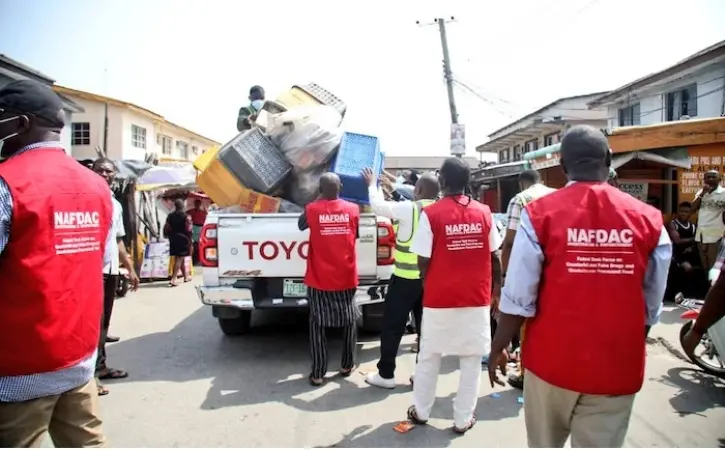Recent enforcement operations targeting illegal drug sales in three major cities—Lagos, Onitsha, and Aba—generated N2.5 billion in fines, according to the National Agency for Food and Drug Administration and Control (NAFDAC).
This was revealed by the agency’s director-general, Prof. Mojisola Adeyeye, on Wednesday when he appeared before the House of Representatives Committee on Food and Drug Administration and Control.
The sum was obtained as fines from vendors who were found to be selling phony and inferior pharmaceuticals in public marketplaces throughout the nation, she said.
She explained that all of the money had been sent to the official NAFDAC account.
N159 million of the N2.537 billion earned had to be borrowed from a donor-funded grant in order to support the enforcement actions, while N996 million of that amount was needed to carry them out.
The remaining N206 million was the agency’s balance after an additional N1.175 billion was spent on regulatory expenses.
The operation, which entailed the deployment of more than 1,300 security personnel, revealed a wide range of breaches, including the sale of expired medications, unregistered medications, and improper storage methods, Prof. Adeyeye added.
She stated, “The charges were paid straight into NAFDAC’s account.” “Our activities in Lagos, Onitsha, and Aba cost us close to N1 billion. We had to borrow N159 million from a donor grant because of our low budget.
After N1.175 billion was spent on regulatory actions, roughly N207 million was left over.
“Some traders were caught dealing in restricted drugs like tramadol and other dangerous substances,” she said.
The fines, she emphasized, were required to enforce standards and were not punitive.
In order to promote compliance, the default penalty for breaking Good Distribution and Storage Practices (GDSP) was reduced to N500,000 in many instances.
“The Federal Government’s revenue constraints have severely undermined the agency’s capacity to sustain similar enforcement operations,” Adeyeye bemoaned.
Despite having N19 billion in its account at the end of 2023, she clarified, N9 billion was taken out before the agency could access it, and just N4.5 billion was ultimately made available.
In his remarks, Adeyeye characterized NAFDAC’s 2024 operation in Kano as a special court-ordered intervention that was very different from the enforcement measures in southern cities.
The raid came after a Federal High Court ruling on February 16, 2024, which ordered open drug market vendors to relocate to the recently constructed Kanawa Pharmaceutical Centre, a Coordinated Wholesale Centre (CWC), she claimed.
The merchants fought back. Violent threats were made. In response to their shop locks, we used heavier padlocks to secure them,” she stated.
Only once they consented to move to the regulated CWC were they permitted to reopen.
The court mandate and the unstable security situation in Kano prevented the collection of fines or administrative charges, in contrast to the activities in the south.
Following their relocation, post-marketing surveillance was carried out.
At the beginning of January 2024, she said, “our accounts had just been frozen and reopened with a zero balance.”
Read Also: Presidency: Nigeria’s Security Situation Improved, Ongoing Issues Are Criminal Tendencies
“We had to comply with the court’s order, moving more than 1,300 stores to the regulated facility, despite the financial strain.”
Since Kano State was the only state that had complied with the presidential instruction long before she took office, she praised the Kano State government for creating the CWC.
Lagos, Onitsha, and Aba, on the other hand, lacked CWCs, therefore NAFDAC was forced to examine and punish violators.
Adeyeye responded to lawmakers’ concerns over what they saw as preferential treatment of Kano traders by stating that the agency’s actions were motivated by the court’s urgency and the danger to its employees.
“More charges or inspections might have been ideal in retrospect,” she stated. However, the situation was too unstable; one of our legal professionals almost suffered an attack.
We had to put safety and following the court order first.
Adeniji Nma, NAFDAC’s Director of Finance and Accounts, also gave the committee a briefing, explaining that the agency can now automatically remove a sizable amount of its earnings because the Office of the Accountant-General of the Federation (OAGF) reclassified NAFDAC as a revenue-generating agency.
She stated that since 2024, half of all payments given to NAFDAC had been withheld and sent to the federal government as a result of an order by the OAGF.
By 2025, the deduction had grown to 75%. Funding our operations is made very difficult by this, particularly when the majority of our payments are service-based and directly related to inspections and other activities.
Hon. Emeka Idu, a committee member, requested a thorough, site-by-site analysis of the money obtained from the enforcement operations after the presentation.
The presentation was deemed insufficient by the committee chairperson, Hon. Regina Akume, who instructed the agency to provide a comprehensive report detailing every revenue received and disbursed, including precise numbers from every city.
She stated, “We still don’t have a complete picture of the inflows and expenditures.” “You must return, clean up your records, and then provide a proper breakdown.”



